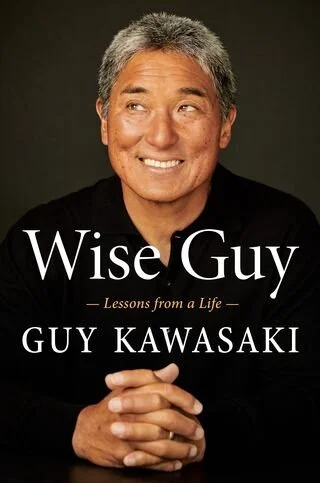7 Life Lessons From a "Wise Guy"
Guy Kawasaki got his B.A. in psychology from Stanford in 1976, where he took his intro psych class from the legendary Phil Zimbardo. Kawasaki didn’t stick with psychology, but went on to law school at UC Davis. It took him only a week to realize that wasn’t his career path either, so he dropped out and went on to get an MBA from UCLA, and then become a jewelry salesman. But if you’ve heard of Kawasaki, it’s probably not because of his reputation selling diamonds, but because of the next job he took—as an evangelist.
Evangelist!? Well, Kawasaki didn’t become a Billy Graham-style fire and brimstone preacher; instead, he became an evangelist for a spanking new (and rather expensive) piece of technology—the MacIntosh computer. The price for that little box, with its 9-inch screen and minuscule 128K RAM, was $2,500 (that would be $7,126.35 today)!
But that pricy little piece of technology arguably changed the world, splashing onto the scene with the Anti-Big Brother Superbowl ad, which proclaimed that “On January 24th, Apple Computer will introduce Macintosh, and you’ll see why 1984 won’t be like ‘1984.’” Kawasaki personifies the concept of being at the right place at the right time.
In his job as a Mac Evangelist, Kawasaki got to work with the legendary Steve Jobs (who he also managed to insult in front of a group of Apple executives). Kawasaki’s career-hopping trajectory didn’t end with MacIntosh, but he went on to become the author of 15 books, a public speaker, and a Silicon Valley venture capitalist, among numerous other roles.
Guy Kawasaki's memoir
Source: From Guy Kawasaki's "resources for reviewers" Used with permission
I recently had the honor of being introduced to Kawasaki by Bob Cialdini, who has been a guest on Kawasaki’s “Remarkable People” podcast. Some of Guy’s other "remarkable" guests have included Jane Goodall, Steve Wozniak, Andrew Yang, Steven Pinker, Paul Theroux, Neil DeGrasse Tyson, Martha Stewart, Kristi Yamaguchi, and behavioral scientists Phil Zimbardo, Katy Milkman, Jonah Berger, and Angela Duckworth. (Stay tuned for a future episode, in which my remarkable son Dave and I will join that list, to chat with Guy about our new book.)
I just finished reading Kawasaki’s delightful memoir, titled Wise Guy: Lessons from a Life. Guy has a great semi-self-deprecating sense of humor (I say “semi” because, between stories in which he laughs at himself, he also manages to reveal himself as not only successful but also wise). The book is full of engaging stories about Guy and the people he’s met, each of which is followed by a bit of wisdom he picked up. Here are seven of the nuggets I took away:
Don’t be afraid to exploit your connections. Kawasaki lists the various jobs he has had in his life, along with the reason he got the job. He is unashamed to say “nepotism” is the reason he got most of his jobs (he was unqualified to work for Apple, but his college roommate pulled strings to get him his first job there; his father knew the Lieutenant Governor of Hawaii, which got him another job). I’m going to be on Kawasaki’s podcast not because I am myself a “remarkable person,” but because I know Bob Cialdini, who is a friend of Guy’s. (my connection with Cialdini is also a primary reason I got my job at ASU. So, thanks Bob.)
Smile. Kawasaki notes that smiling and laughing are self-perpetuating. Indeed, when other people see you smiling and laughing, they’ll be happy the next time they see you. In an organizational context, it is hard to overestimate the importance of radiating positive energy.
Default to yes. Kawasaki argues that the upsides of helping people vastly outweigh the slight dangers of being exploited. When Dave and I were gathering bits of wisdom for our book, the most frequent advice we heard was not “do what’s right for you,” but instead “be nice to others.” Kawasaki argues that there’s no such thing as being too nice (see How to overcome 5 obstacles to kindness).
Acquire skills that are valuable to others. He points out that a rare skill is only valuable if is useful to other people. A big theme of Kawasaki’s story is this: Success in a career involves a lot of consideration of other people’s needs.
Adopt a growth mindset. Carol Dweck is another Stanford psychology professor who influenced Kawasaki—her findings, now classic, suggested that kids who viewed their test performances as measurements of their native intelligence would stop trying after a failure, but those who were taught to think of their performances as measurements of their effort worked harder after failure.
Embrace grit. Kawasaki notes that great ideas are easy to come by, but implementing those ideas is a whole other story—requiring hard work and persistence. Of course, it helps when you have fun jobs that match your talents, in which case, it’s a lot easier to persist. My mentor Bob Cialdini (famous for his principles of persuasion) still shows up for work every day, even though he’s been officially “retired” for a decade now.
Enjoy your family and friends before they are gone. I found it completely charming that a Silicon Valley entrepreneur mentioned this as his “number 1” bit of advice when he talked to the graduating class at Palo Alto high school. He puts his money where his mouth is, apparently, because many of his stories are about hanging out with his own kids, even learning surfing and hockey late in life, because his kids got interested in those sports.

